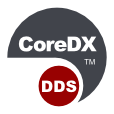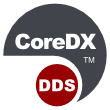
|
November CoreDX DDS Connection 2020
Welcome to the Twin Oaks Computing, Inc
Newsletter!
Our monthly newsletter brings you news and information
about Twin Oaks Computing and our CoreDX DDS middleware.
Be sure to "like", "follow" and "friend" us on our Social
Networking sites for fun facts, free giveaways, and stories
about Communications Middleware, Technology, and Twin Oaks Computing.
Office Holiday Closure
Please note: Our offices will be closed Thursday, December 24 through January 1st to allow our employees time with their families during the holidays. We will re-open on Monday, January 4th. All of us at Twin Oaks Computing wish everyone a safe and happy holiday season!
15 Quality of Service facts about CoreDX DDS
Twin Oaks Computing is proudly announcing 2020 is our 15th anniversary of providing practical middleware expertise. To celebrate, we've come up with 15 interesting Quality of Service facts about CoreDX DDS:
- Most QoS policies used for discovery entity matching are set on a DataWrwiter or DataReader, except for one. The PARTITION QoS, while it effects the matching of DataWriters and DataReaders is set on the Publisher and Subscriber.
- The HISTORY QoS policy is often initially mis-understood. The primary purpose of the History QoS Policy is to configure the behavior of DDS when a DataWriter's or DataReader's data cache becomes full.
- It's easy to configure CoreDX DDS for single threaded application using the THREADING_MODEL QoS Policy. The same DDS API is used, with the addition of a DomainParticipant::do_work() call.
- Many CoreDX DDS QoS extensions are located in the RTPS_Writer and RTPS_Reader QoS Policies. These extensions include configuration of data batching, content filters, and the Reliability protocol, among others.
- In order to make use of TRANSIENT_LOCAL QoS configuration of Durability, the Reliability QoS policy must be set to one of the 'RELIABLE' options.
- The following QoS policies must be compatible in order for DataReaders and DataWriters to match:
- Deadline
- Destination Order
- Durability
- Latency Budget
- Livliness
- Ownership
- Partition
- Reliability
- CoreDX DDS application can make use of an "ACK-less" Reliability setting, which is an alternative Reliability option providing balance between the performance of BEST_EFFORT and the robustness of RELIABLE.
- The following QoS policies are not shared during discovery (and they effect only the entity on which they are configured):
- Lifespan
- Ownership Strength
- Reader Data Lifecycle
- Time Based Filter
- Writer Data Lifecycle
- Logging
- Thread Model
- While some DDS products use the Property QoS policy for vendor-specific extensions, CoreDX DDS currently uses it only for its standardized purpose of configuring DDS security configurations.
- Most QoS policies are set on DataWriters and DataReaders. The following are exceptions - set on other DDS Entities:
- Entity Factory (DomainParticipantFactory, DomainParticipant, Publisher, Subscriber)
- Group Data (Publisher, Subscriber)
- Partition (Publisher, Subscriber)
- Presentation (Publisher, Subscriber)
- Property (DomainParticipant)
- Topic Data (Topic)
- Discovery (DomainParticipant)
- Entity Name (all Entities)
- Logging (all Entities)
- Peer Participant (DomainParticipant)
- ThreadModel (DomainParticipant)
- The LATENCY_BUDGET QoS policy is a little used but useful configuration item - allowing the application to tweak latency or throughput of individual data streams within the application.
- The following are the only QoS policies that may be changed dynamically, after the entity has been created and enabled:
- Deadline
- Entity Factory
- Group Data
- Latency Budget
- Lifespan
- Ownership Strength
- Partition
- Reader Data Lifecycle
- Time Based Filter
- Topic Data
- User Data
- Writer Data Lifecycle
- Logging
- Do you have application description data that should be shared, but do not want the overhead of dedicating a Topic or additional fields in an existing Topic? The USER_DATA QoS policy is used for application data associated with DataWriter or DataReader, and is shared with matched entities during standard DDS discovery,
- The Logging QoS policy allows configuration of logging on individual entities within the application. However, the application must be linked against the 'logging' version of the CoreDX DDS libraries in order for the Logging QoS configuration to take effect.
- Using the ENTITY_FACTORY QoS autoenable_created_entities configuration is important when applying configuration to a DDS entity after it's created but before it's enabled. It is used most commonly to configure a DomainParticipant's transports - which must be done before the DomainParticipant is enabled.
For more information, please visit ourwebsite.
On Demand Panel: Intelligent Decision Making - IoT & AI Data Analytics for Predictive Maintenance & Process Optimization.
Nina Tucker, VP of Technology for Twin Oaks Computing, is joined by other industry leaders to discuss the following:
Identifying target-rich, high-value data that can be used to generate actionable insights
- Using cloud analytics platforms to derive value from IoT data
- Discussing the barriers to widespread IoT/AI/Big Data value delivery and how these might be overcome
- Real time data analytics in practice - examples of how IoT/AI data is creating business efficiency and revolutionalising working practices in the predictive maintenance space.
Register for this on demand content here.
Intro to DDS for Lockheed Martin Employees - Webinar now Available on Demand
Did you miss last week's webinar? Intro to DDS for Lockheed Martin Employees is now available to view on demand.
Contact us for the link. You must have a Lockheed Martin email to register. .
Try the full-featured CoreDX DDS product free for 30 days
Check out the newest DDS standardized features and get your hands on the leading small footprint Data Distribution Service implementation to see what it can do for you.
CoreDX DDS v5 continues to focus on resources and performance while incorporating new features and enhancements. Our evaluation copies include the full DDS API and standardized wire protocol, including:
- All language bindings for the DDS API's (C,C++, Cxx, C#, Java, Python, JavaScript)
- Full X-Types support including IDL, XML, and Dynamic type representations
- Remote Procedure Call over DDS (RPC over DDS)
- XML Application Definition
- DDS Security (upon request)
With these enhanced features, CoreDX DDS is the perfect middleware solution to meet the challenges of today's Industrial Internet of Things (IIoT) systems. Learn more here.
The evaluation is available here for direct download for the most common platforms, including Linux, Solaris, and Windows. Download your free 30 day trial of CoreDX DDS here.
Upcoming Events
November 4-5, 2020: FACE Expo, Solomons, MD, USA
November 30-December 3, 2020: I/ITSEC, Orlando, FL, USA
December 7-11, 2020: OMG Technical Meeting, Austin, TX, USA
March 22-26, 2021: OMG Technical Meeting, Reston, VA, USA
June 14-18, 2021: OMG Technical Meeting, Orlando, FL, USA
September 22-23, 2021: IoT Tech Expo North America
September 27-October 1, 2021: OMG Technical Meeting, Burlingame, CA, USA
|









